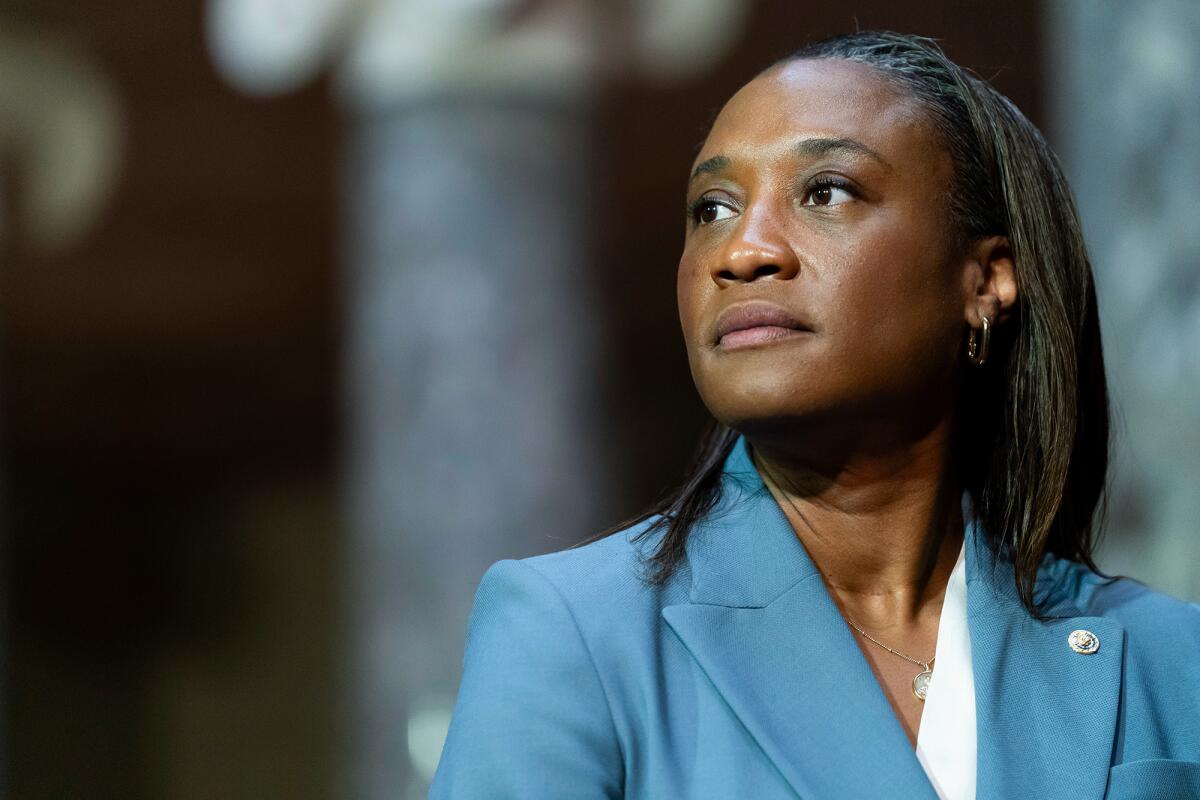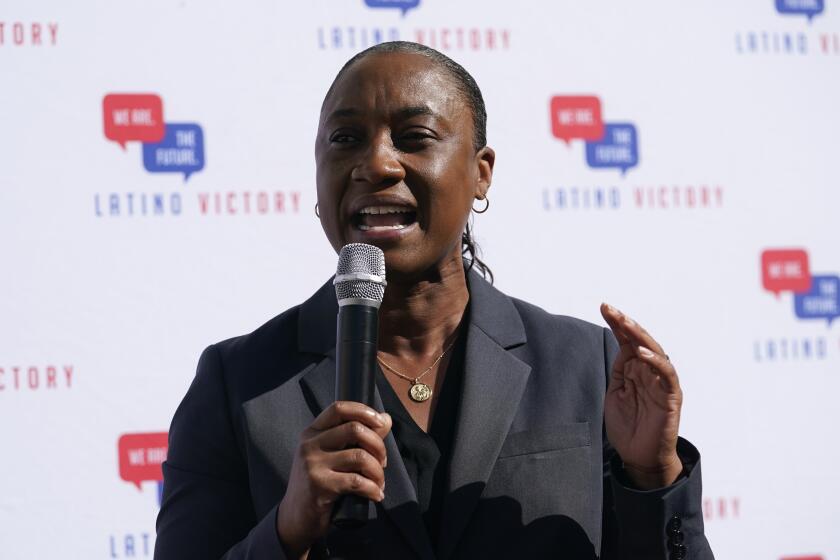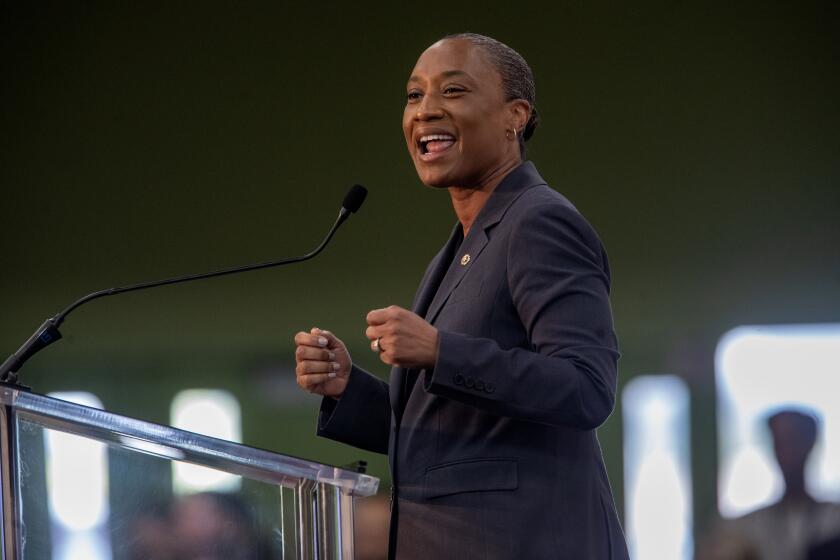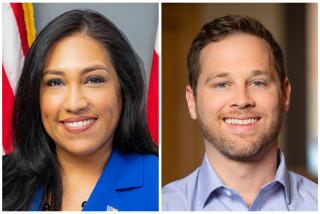Laphonza Butler aces her first political test, passing on uphill Senate run

- Share via
Laphonza Butler has been living a whirlwind these last few weeks.
Overnight, she went from being a campaign strategist and behind-the-scenes operative — unknown to most, save political insiders — to a U.S. senator representing nearly 40 million residents of the most important state in the union.
Even Butler was surprised when Gov. Gavin Newsom tapped her to replace the late Sen. Dianne Feinstein. It was like plucking a set designer from the wings and placing her, with barely any notice, directly at center stage.
Since then — as Butler learned which Capitol Hill stairways head where, flew cross-country to meet with assorted constituencies and developed COVID-19 — one overriding question trailed her: Would she run for a full term in 2024?
On Thursday, she gave her answer: No.
It was the right decision, and a politically astute one.
By forgoing a campaign that would have been difficult to win, Butler leaves herself well-positioned for a future run if she chooses to seek office. It also allows the state’s very fresh freshman senator to devote herself full time to her congressional duties.
Which is exactly what Butler should do.
Sen. Laphonza Butler announced she would not run for a full term in 2024. Her entry would’ve shaken up an already volatile race that includes three prominent Democrats.
The decision, announced abruptly, was hastened by a number of impending deadlines, among them cutoffs to vie for the state Democratic Party’s endorsement and to be included as a candidate in the information guide mailed to every California voter.
But the most important date facing Butler was March 5, when the state holds its top-two “jungle” primary. (All candidates are on the same ballot and the two receiving the most votes will advance to a November runoff, regardless of party.)
The first contest is a little over four months from now, an incredibly short time to ramp up a statewide campaign, raise the many millions of dollars needed to advertise and develop even a cursory relationship with voters sprawling over California’s vast expanse.
During Kamala Harris’ run for president, a 2019 poll taken by the Public Policy Institute of California found nearly a quarter of California voters had no opinion of her performance as the state’s junior senator — suggesting even after more than two years on the job Harris was something of a mystery.
Feinstein, who became the state’s best-known politician, took ages to develop her near-universal Eureka-to-Yucaipa name recognition.
Butler faced other challenges.
She was living in Maryland and working in Washington, D.C., leading the women’s campaign organization Emily’s List, before her Senate appointment. Her lack of longstanding California residency would have surely become an issue.
A former labor leader, Butler also faced agita from the political left for the handsome sum she made working for Uber as the ride-hailing service worked to undermine its drivers’ push for better pay and working conditions. That, too, would have been an issue.
Neither, however, posed insurmountable hurdles.
The greater impediments for Butler were time and money, two vital ingredients to political success.
She would have started flat-footed against a formidable field of contenders, including Democratic Reps. Adam B. Schiff, Katie Porter and Barbara Lee, who collectively have already amassed tens of millions of dollars.
Butler, for her part, has not demonstrated particular fundraising prowess. Some familiar with her work at Emily’s List were underwhelmed with its financial ledger under her watch.
Also, political handicappers tended to overstate the advantage of Butler’s labor connections. Although she enjoys a number of personal connections, several unions had already committed to others in the race, or assumed a wait-and-see approach. It’s not hard to imagine much of organized labor staying neutral, or endorsing multiple candidates, had Butler belatedly entered the Senate contest.
In bowing out, Butler issued the kind of statement — brave, a little cocky — one often hears under such circumstances.
“Knowing you can win a campaign doesn’t always mean you should run a campaign,” she said.
The rest of her written remarks seemed more cognizant and truer to the heart.
“I know this will be a surprise to many because traditionally we don’t see those who have power let it go,” Butler stated. “It may not be the decision people expected but it’s the right one for me.”
It was also a gift to Newsom, after his flip-flopping over whether his appointee should merely serve as caretaker or pursue election to a full term. By standing aside, Butler saw to it there is no incumbent running in 2024 — meaning no gubernatorial thumb on the scale, which Newsom had said he wished to avoid.
California’s new senator has cultivated relations with powerful mentors, including Vice President Harris. Can she also win over voters if she runs for a full Senate term?
At 44, Butler could have a good, long political career if she wishes to stay in elected office.
Once she departs the Senate, it’s not likely she’ll return any time soon, given the relatively young age of California’s other senator, 50-year-old Alex Padilla, and the likelihood that whomever voters choose in November 2024 will serve a good long time.
But the California governor’s seat comes open in 2026, and Butler could be an attractive candidate in a wide-open field.
She’ll now have a little over a year to rack up some achievements in Washington, travel the state to introduce herself to voters and, if Butler chooses, lay the necessary political and financial groundwork for a future political run.
Far better than working half time in the Senate and half time on a quite possibly futile attempt to stay there.
To run or not to run was the first major political test facing California’s newly minted senator.
She made the smart move.
More to Read
Get the latest from Mark Z. Barabak
Focusing on politics out West, from the Golden Gate to the U.S. Capitol.
You may occasionally receive promotional content from the Los Angeles Times.













